News

Depositors of Standard Credit and Finance to get compensation
Disgruntled depositors of The Standard Credit and Finance Ltd (TSCFL) are to be compensated under the Sri Lanka Deposit Insurance and Liquidity Support Scheme, the Central Bank announced on Friday (07).
Compensation payments will be made in line with the provisions of the Sri Lanka Deposit Insurance Regulations. Instructions on the application criteria will be notified through print and social media, the Central Bank added.
The depositors of the Standard Credit and Finance Ltd. have been informed to submit their duly completed claim forms along with the required documentation to the Resolution and Enforcement Department of the Central Bank once the notification is issued in the media in due course.
The license issued to the TSCFL to carry on finance business has been cancelled with effect from 25.07.2018 in terms of the provisions of the Finance Business Act No. 42 of 2011.
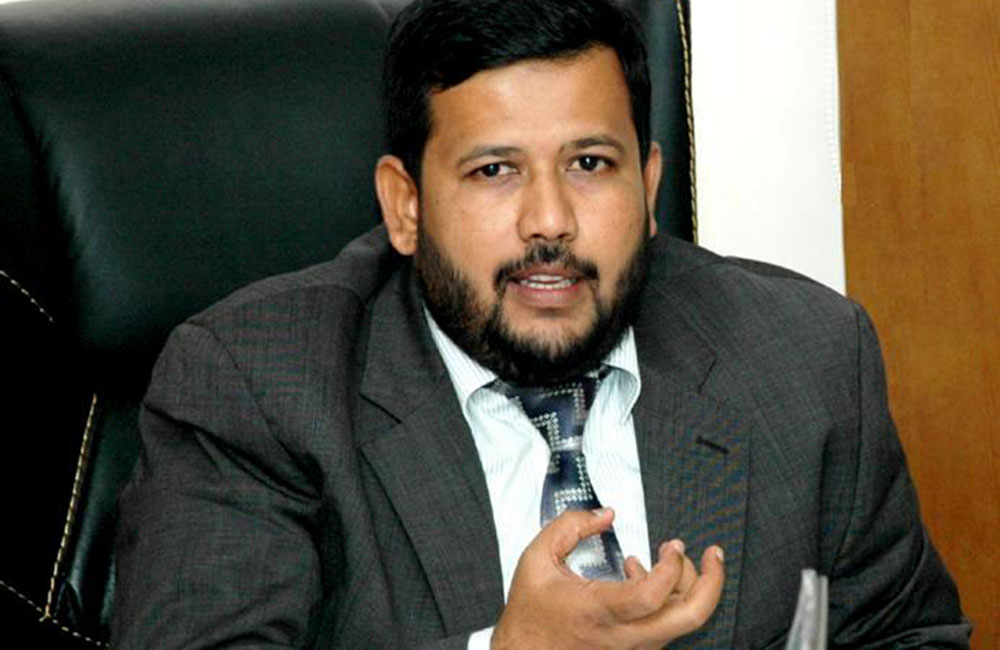
Baithiudeen's security under threat?
Leader of the All Ceylon Makkal Congress (ACMC) Rishad Bathiudeen appeared before the Criminal Investigations Department today yesterday to make a complaint regarding a controversial statement made by the Operations Director of the Anti-Corruption Front, Namal Kumara.
Namal Kumara had earlier stated that there was an attempt to assassinate ACMC leader Rishad Bathiudeen in addition to the alleged assassination plot on several VIPs including president Maithripala Sirisena.
Speaking to media outside the CID premises, Bathiudeen said that he is perplexed as to why his security was completely withdrawn when inquiries about a potential assassination plot against him are underway.
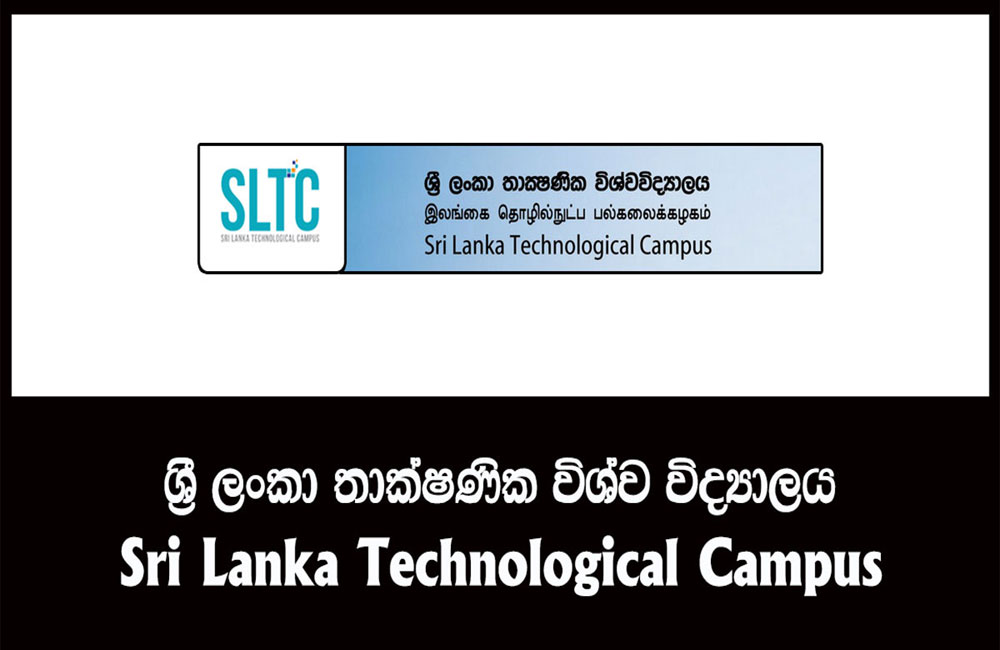
Sri Lanka Technological Campus inaugurates management programmes
The Sri Lanka Technological Campus (SLTC) affiliated to Sri Lanka Telecom (SLT) announced the launch of their management programmes offering multiple degree pathways.
These education avenues represent many disciplines including, Accounting and Finance, Marketing, Supply Chain Management, Human Resource Management, Operations Management, and Tourism and Hospitality Management. SLTC’s business school logo was unveiled at the Trace City Colombo 10 recently. SLTC also promises to engineer the professional impetus required for Sri Lanka’s evolving economic landscape by providing industry relevant, timely higher education opportunities to the country’s youth.
The SLTC has added this vital industry requirement to its portfolio of degree programmes to prepare Sri Lanka’s next generation, giving careful consideration to the economic growth direction of the county and upon a well thought through discussion process with industry leaders representing multiple spheres.
Thus, SLTC Business School was inaugurated with a vision of fulfilling an evolving future demand in numerous professional spheres and management disciplines. The SLTC at Padukka is a large university providing many facilities to its students.
The university is a fully owned subsidiary of the Sri Lanka Telecom. The university is equipped with a Tissue Culture Laboratory and a Fiber Optic Laboratory in addition to other facilities.
It is also linked to Microsoft and other international universities in USA, Australia, New Zealand and Vietnam.
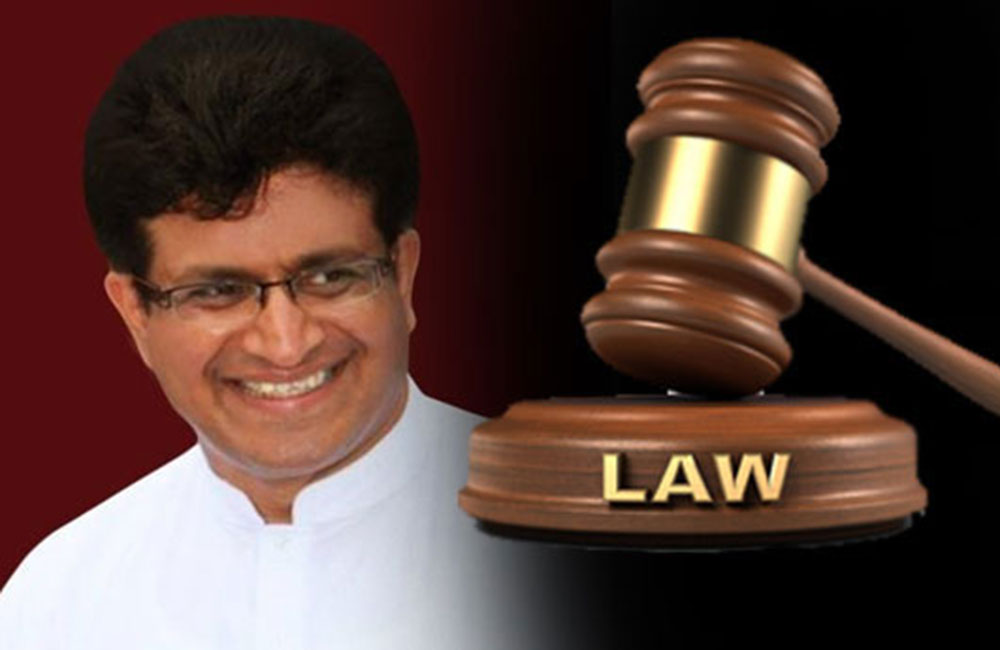
Gammanpila tries to approach Chief Justice through Rev Fr. Dilan
It is reported that Udaya Gammanpila has recently made attempts to meet Chief Justice Nalin Perera through Rev. Father Dilan Perera, the Parish Priest of the Our Lady of Fatima Church in Maradana.
Nalin Perera belongs to the same parish and is a congregant of the Our Lady of Fatima Church of which Fr. Perera is the parish priest. Rev. Father Dilan Perera belongs to the Missionary Oblates of Mary Immaculate order in the Catholic Church which is not under the direct authority of the Cardinal.
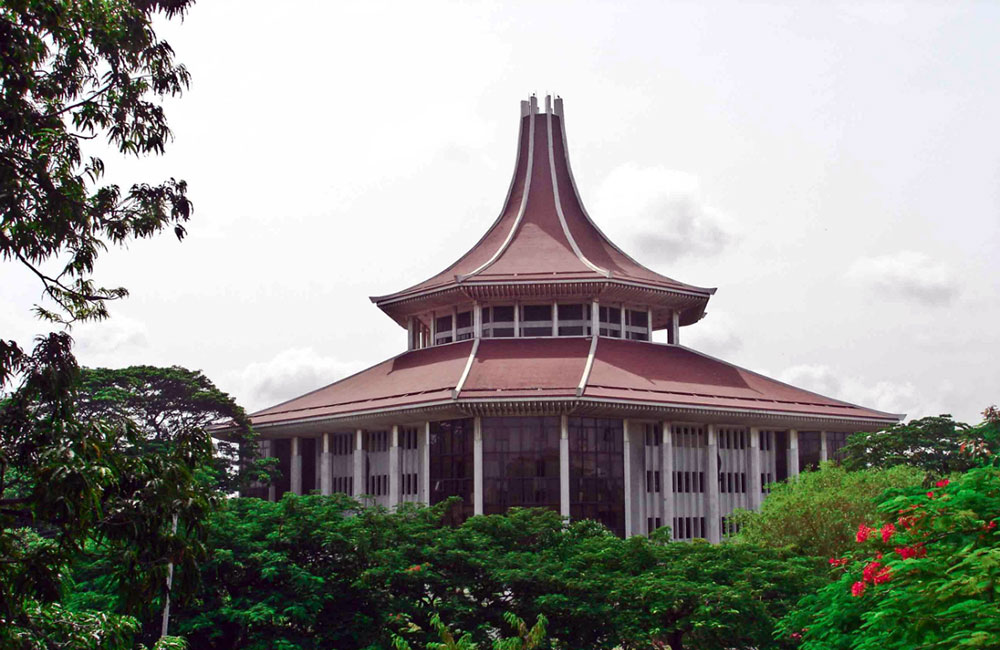
Supreme Court extends interim injunction till Dec 10
The Interim injunction order issued against the dissolution of Parliament by the Supreme Court has been extended till the 10th of December.
The seven-judge bench of the Supreme Court commenced hearing of the petitions challenging the dissolution of Parliament for the fourth consecutive day today.
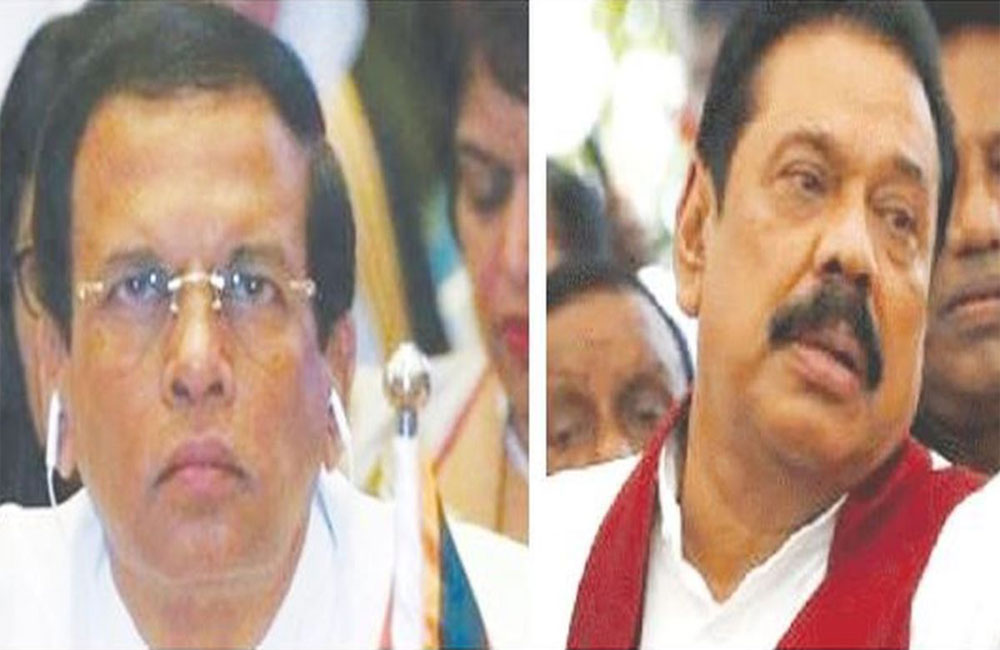
Rajapaksa reined in
The political crisis in Sri Lanka deepened further on Monday when the nation’s Court of Appeal restrained Mahinda Rajapaksa, unconstitutionally sworn in Prime Minister when the legitimate Prime Minister Ranil Wickremesinghe was still in office and who suffered two votes of no-confidence in Parliament on 14 and 16 November, from functioning from his offices in the government secretariat in Colombo.
Rajapaksa’s ‘dummy’ cabinet ministers were also ordered to stop functioning from their allotted offices. Last Thursday and Friday Parliament passed two motions stopping all cash flow to Rajapaksa and his so-called cabinet ministers who lack legitimacy even as they were busy taking administrative decisions and passing orders.
The bureaucracy was placed in a piquant situation not knowing which way to turn. Supposed to be above politics, the bureaucracy is expected to work for the government of the day.
With two functioning Prime Ministers, some have taken the side of Rajapaksa, adding to the confusion in the secretariat. Ever since the President, Maithripala Sirisena, sacked Wickremesinghe as Prime Minister without following the constitutional procedure and plunged Sri Lanka into an unprecedented political crisis, the people are at a loss to know who is in control in Colombo.
The President convened a meeting of all secretaries to the ministries about a month ago and assured them the political crisis will be resolved ‘soon.’ But no solution is at sight as of now. Every attempt of Sirisena at finding a solution to the crisis brought about by his rash act of dismissing Wickremesinghe as Prime Minister illegally seems to have backfired.
On 9 November he dissolved Parliament and called for snap election on 5 January.
A Bench of the Supreme Court led by Chief Justice Nalin Perera on 13 November stayed dissolution of Parliament and ordered the Election Commission not to proceed with the proposed snap election on 5 January.
Meanwhile, Rajapaksa and many of his supporters withdrew from Sirisena’s Sri Lanka Freedom Party and joined the newly floated Sri Lanka’s People’s Party, leaving the President isolated politically.
The Wickremesinghe-led United National Party remains intact. Should Parliament seek a fresh vote of confidence, he has the numbers. The Court of Appeal has asked Rajapaksa to explain on 12 December on whose authority he and his cabinet Ministers continue to be in office despite Parliament voting them out twice.
In the wake of Monday’s Appeal Court order, there is no Prime Minister or government in Sri Lanka. Former President Chandrika Kumaratunga regretted Sirisena has betrayed the January 2015 mandate of the people and brought the country to “a dangerous precipice of chaos, anarchy and breakdown of the rule of law.”
(The Statesman)
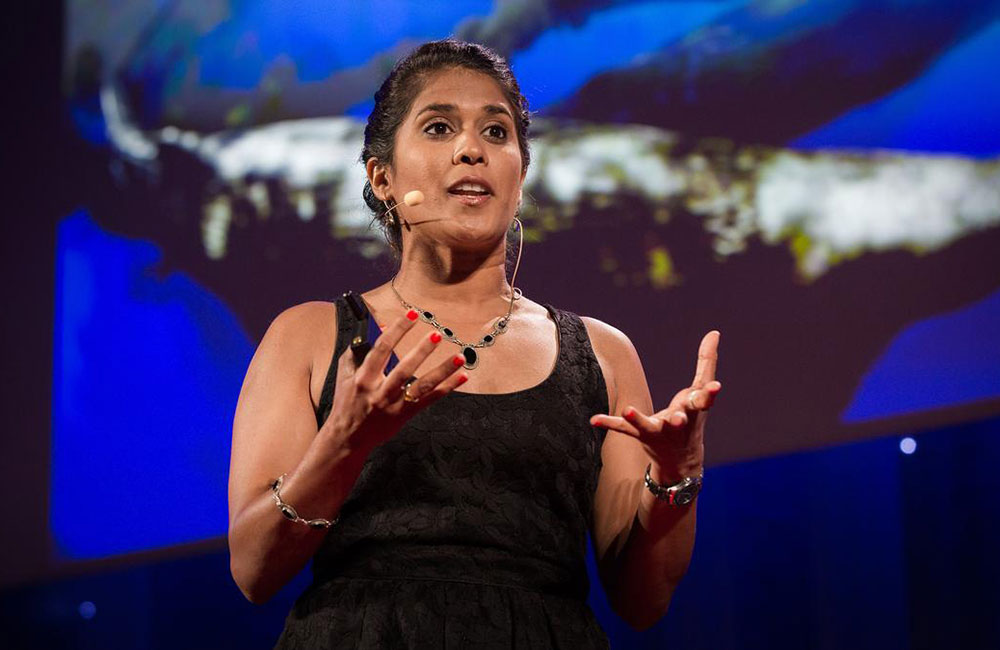
Dr Asha De Vos named 'Sri Lankan of the Year' by LMD
Sri Lankan marine biologist, ocean educator and pioneer of blue whale research in the northern Indian Ocea, Dr Asha de Vos has been named as the 'Sri Lankan of the Year' by LMD.De Vos holds a number of academic qualifications in her area of expertise, but bypassed academia to establish Oceanswell – Sri Lanka’s first marine conservation research and education nonprofit.
The Sri Lankan Blue Whale Project, which commenced in 2008, is the first long-term study on blue whales in this region – it is Oceanswell’s flagship project. The research conducted through this project has led to many key research publications, and is used to dictate policy at both local and global levels.
Oceanswell is engaged in ‘thinking big’ to solve challenges, mentoring to mobilise, conservation research, storytelling to save oceans and educating to empower.
De Vos travels across the world to ensure that the oceans of the global south have a voice on the international stage – and indeed, to increase awareness of the magic of what lies beneath them while also sharing her stories here in Sri Lanka.
In an interview with The Wiley Network earlier this year, she confessed to being “obsessively passionate” about sharing her ocean adventures and science with everyone. Moreover, de Vos emphasised the need to protect blue whales and that “there are ways to ensure that the economy of the country is not affected while also protecting this species that we use for our tourism industry.”
She was recently featured on the BBC 100 Women 2018, which is a list of inspiring and influential women from around the world.
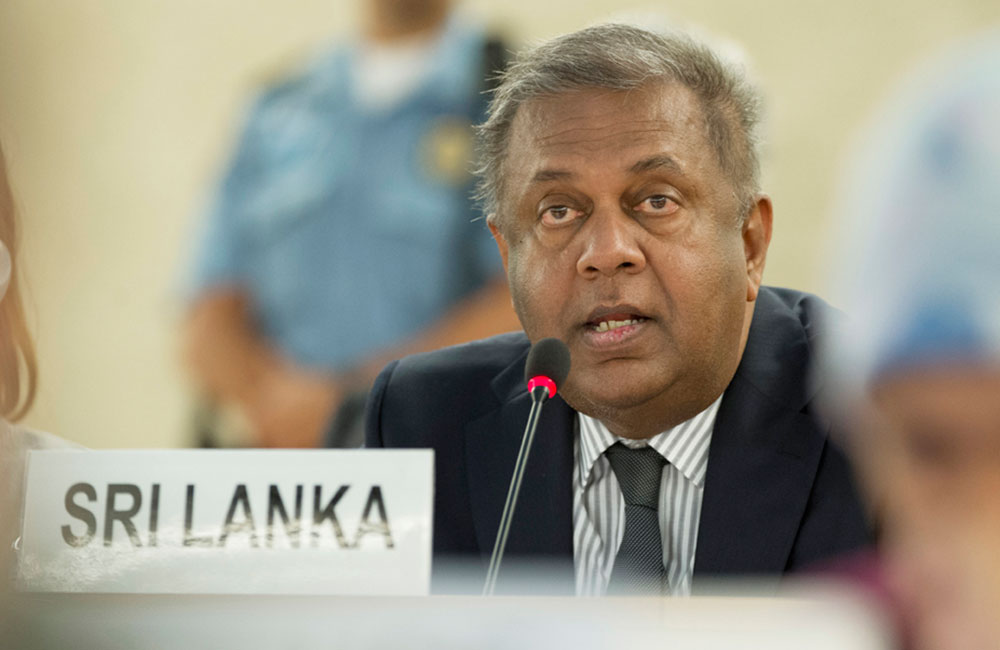
Sirisena's actions have made Sri Lanka the only country without a stable govt. in the world: Mangala
Former Minister of Finance and Media Mangala Samaraweera said that Sri Lanka is the only country in the world currently without a stable government in place.
"On December 3, the Court of Appeal granted an interim injunction after taking into consideration the petitions filed against President Maithripala Sirisena's conspiratorial and unconstitutional decision to appoint a Prime Minister and a Cabinet on October 26. While 48 hours have elapsed since the granting of the interim injunction, no step has been taken to establish a stable government yet. As a result, in this situation, Sri Lanka, not only in its own history but within the democratic world has become the only country to exist without a government," Samaraweera said in statement.
Samaraweera also said that president Sirisena has been trying mislead the masses by trying to trivialize the issue of not having a government by quoting false examples of similar instances elsewhere in the world thereby displaying his ignorance on international affairs.
"At the Sri Lanka Freedom Party (SLFP) sessions, he was quoted as saying that despite this phenomena of not having a government is new to Sri Lanka, such situations have existed in other countries the world over. The example he presented to support his claim was Germany. In a feeble and unsuccessful attempt to justify his unconstitutional conspiracy, President Sirisena claimed there was no government in Germany for a period of six months following its last elections," he said.
"During the 2017 German General Elections, no political party was able to secure a clear majority. Therefore, to establish a stable government following months and several rounds of discussions, they were able to form a government in March 2018. In the time period which President Sirisena claimed the country was without a government, all government administration was handled by German Chancellor Angela Merkel and her Cabinet of Ministers," Samaraweera said.
"Not only that, in Germany following a No Confidence Motion (NCM) to avoid a situation where the country will be without a government, every time a NCM is presented, the name of the possible successor is always included in the motion as per Germany's Constructive Motion of No-Confidence," he added.
Samaraweera pointed out that a similar situation exists in Sweden today and that at the last General Election, no party was able to secure a majority in order to form a government.
"As discussions were held for months till the government was established, the Prime Minister continued in his role to avoid an unstable situation," he said.
Samaraweera further said that creating a situation where the country is without a stable government is not only against the country’s Constitution, common law but is also internationally illegal and even akin to a dictatorship.
"Even a temporary halt of the Constitution can only happen under a dictatorship. As a result the oldest democracy in Asia, Sri Lanka is now on a downward spiral towards the formation of a totalitarian state. The full responsibility of this lies with President Maithripala Sirisena alone," he said.
By creating such a situation the President has also recklessly violated all the pledges made by him and for his actions, President Sirisena should not only be punished by way of an impeachment but also through the common law of this country, he said
Samaraweera also said that the moment has arrived for everyone who values democracy to gather in spite of partisan, racial and religious allegiances to stand up against those who are responsible for the damage and destruction that have happened to Sri Lanka as a result of the president's actions.
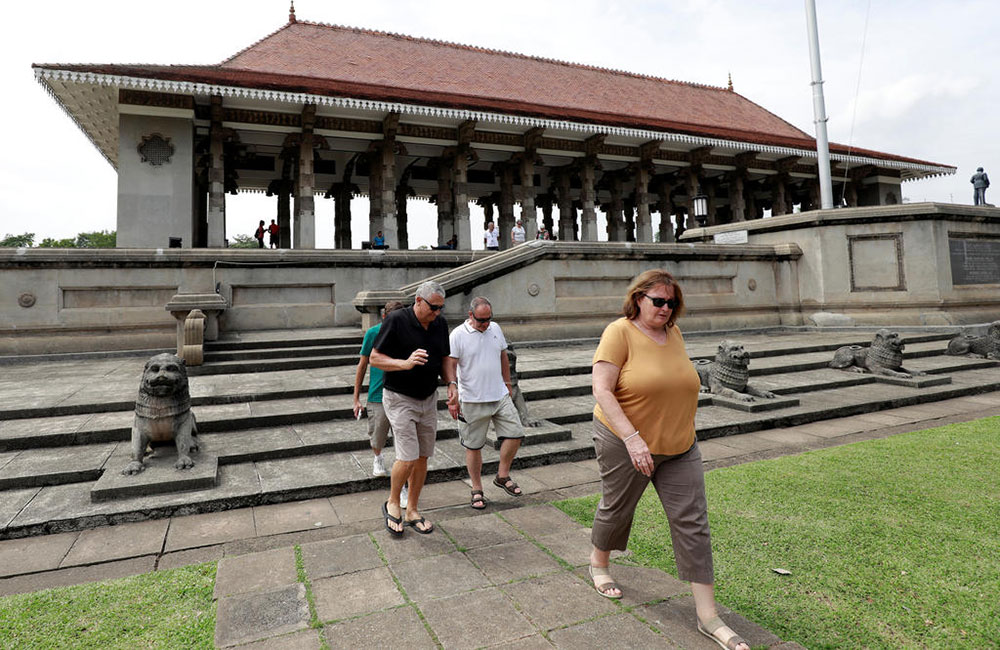
Sri Lanka's political crisis spurs tourists to cancel in peak season
Sri Lanka's travel industry is starting to suffer the fallout of a political crisis in the middle of its peak tourist season, as uncertainty prompts cancellations by both business and leisure visitors.
Tourism makes up about 5 percent of the Indian Ocean island's $87-billion economy, but the president's sacking of the prime minister late in October triggered a crisis that credit rating agencies say has already hit economic prospects.
"We have cancellations in the region of about 20 percent," said Chandra Mohotti, a manager at the luxury Galle Face Hotel in the capital, Colombo, which has about 200 rooms.
"Normally our hotel would be full. We are offering discounts because of the fear that allocations will not be utilized."
Peak season for holidaymakers from Europe, a major source of tourists, along with India and China, typically runs from December to March.
But numerous flight bookings have been canceled, especially from Europe, a source at national carrier SriLankan Airlines told Reuters.
"The crisis started just when tourists take a decision where to go," said the source, who declined to be named. "(It) has discouraged many of them."
Mahinda Rajapaksa, who replaced Ranil Wickremesinghe as prime minister, lacks a parliamentary majority and has been prevented by a court from holding office, delaying the 2019 budget and leading to violent scenes in parliament.
It may be a while before the cancellations show up in arrivals figures, however. Tourist numbers were up 16.8 percent in November on the year, official data showed on Thursday, with visitors from Europe up 37 percent, although numbers from China, Japan, the Middle East, and Southeast Asia all fell.
Last year, more than 2.1 million people visited Sri Lanka, tourism authorities say.
Business travel has also been hit by the crisis, with firms moving meetings to elsewhere in Southeast Asia.
"There have been some cancellations and some have shifted to Singapore and Indonesia," said Sanath Ukwatte, president of the Hotels Association of Sri Lanka, adding that conference and exhibition bookings were the worst hit.
Harith Perera, president of the Sri Lanka Association of Inbound Tour Operators, said he had also seen cancellations in the corporate sector.
"At the moment bookings have slowed down and that is a concern," he said. "If the current crisis drags on, then the impact will be significant. Cancellations are not only from European tourists, but from everywhere." REUTERS
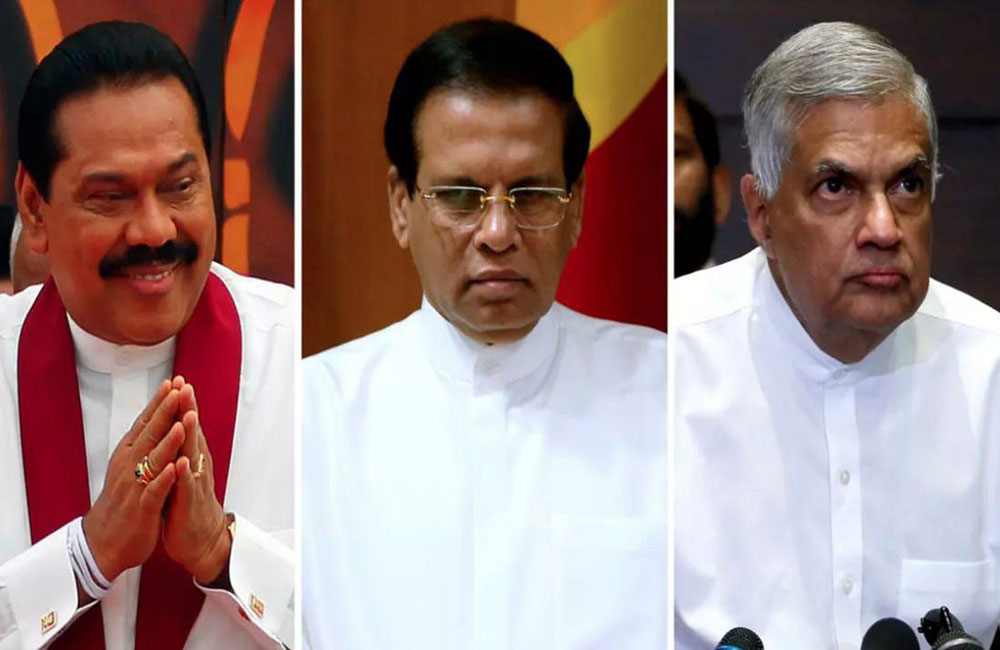
Politicians need to follow the law to resolve the political crisis
The National Peace Council in a statement today called on the President and Parliamentarians to abide by and respect the rulings of the Judiciary and not cause further dissensions in and outside of the parliament.
They said that conflicts can usually be resolved through negoatiations or through the law but our political leaders have been unwilling to find a negitiated settlemet to their conflicts.
The Full Statement by the National Peace Council:
The political crisis that commenced with President Maithripala Sirisena’s decision to dismiss Prime Minister Ranil Wickremesinghe continues. The sticking point at present is that the President is repeatedly stating both in public and private that he cannot work together with former Prime Minister Wickremesinghe and will therefore not appoint him again as Prime Minister. The parliamentary majority has made it clear through written and verbal statements that their choice is indeed former Prime Minister Wickremesinghe. On the other hand, the President is asserting his authority as the elected President to make his own choice of Prime Minister. His appointment of former President Mahinda Rajapakse as Prime Minister was a controversial choice which led to political chaos which political analysts have identified as akin to a political coup albeit a non-violent one. In this context it is necessary to find a solution that is both constitutional and just.
Conflicts can either be resolved through negotiations or through the law. So far our political leaders have been unable and unwilling to find a negotiated settlement to their conflicts. Even as our political leaders continue to be deadlocked in crisis, and violent in Parliament, attention has turned to the judiciary and to their interpretation of the law as the problem solving agency. It has therefore fallen upon the judiciary to resolve the two main problems that beset the polity. The first is the issue of whether the President has the power to dissolve parliament even before four and a half years have elapsed since the commencement of parliament’s term. The second is whether the Prime Minister can be selected at the President’s discretion. These are issues that need speedy resolution. Our country cannot afford a period in which it has no Prime Minister and no Cabinet of Ministers.
The National Peace Council calls on the President and Parliamentarians to abide by and respect the rulings of the Judiciary and not cause further dissensions in and outside of the parliament. When there is deadlock and the country and its people are hurting, it is important that political leaders should rise to the occasion by respecting the judgment of the Judiciary. Democracy is not only about elections and following the will of the majority. It is also about following the rules of democracy. There is no question of losing face in obeying the decisions of the Judiciary. We call on the President to allow Parliament to determine the Prime Minister. This is in keeping with parliamentary tradition, in which the person who enjoys majority support in Parliament is appointed as Prime Minister.
Finally, we wish to state our deep concern that in the event of the President’s unwillingness to abide by the norms of democratic practice, the government will face both domestic and international opprobrium which our country can ill afford. There is an urgent need to recover from the events of the past six weeks as many Parliamentarians have to rebuild their credibility, should they wish to seek re-election following their disruptive and violent behavior in Parliament. The unacceptable behavior of some of them was witnessed worldwide and in Sri Lanka including the younger generation. In a context in which early elections are being proposed as one of the means of resolving this political crisis, we believe that those who behaved in an unparliamentary manner should not receive nominations from their respective parties in order to bring in fresh blood and dignity to Parliament.
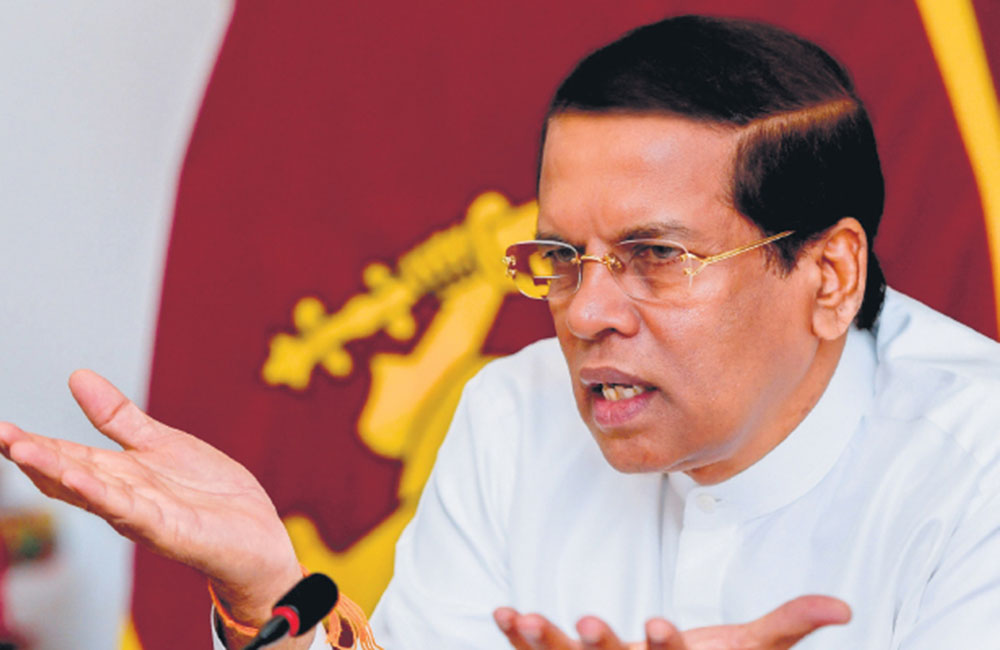
Sirisena says no state functions at luxury hotels after industry leaders decided to boycott tourism award ceremony
The government, under the instructions of president Maithripala Sirisena, has issued a circular to all ministries, departments and boards advising them to refrain from using luxury hotels for their events and meetings.
All state officials have been instructed yesterday to only organise state functions and meetings at auditoriums and institutions affiliated to the government.
However, this comes in the wake of many tourism industry leaders deciding to boycott the Sri Lanka Tourism Awards ceremony held yesterday, as President Maithripala Sirisena had been invited as the Chief Guest. Sirisena didn't attend the awards ceremony that was held at the Shangri-La Hotel in Colombo.
Tourism industry leaders had expressed their disgust at the Sri Lanka Tourism Development Authority (SLTDA) has invited Sirisena, the man who is responsible for ruining the tourism industry this year by engineering a constitutional coup and a political crisis, as the Chief Guest of the event.
Former Tourism Development Minister John Amaratunga MP participated in the ceremony organised by the SLTDA and presented a few awards at the start of the event.
Related News:
Tourism industry leaders to boycott event in protest of Sirisena
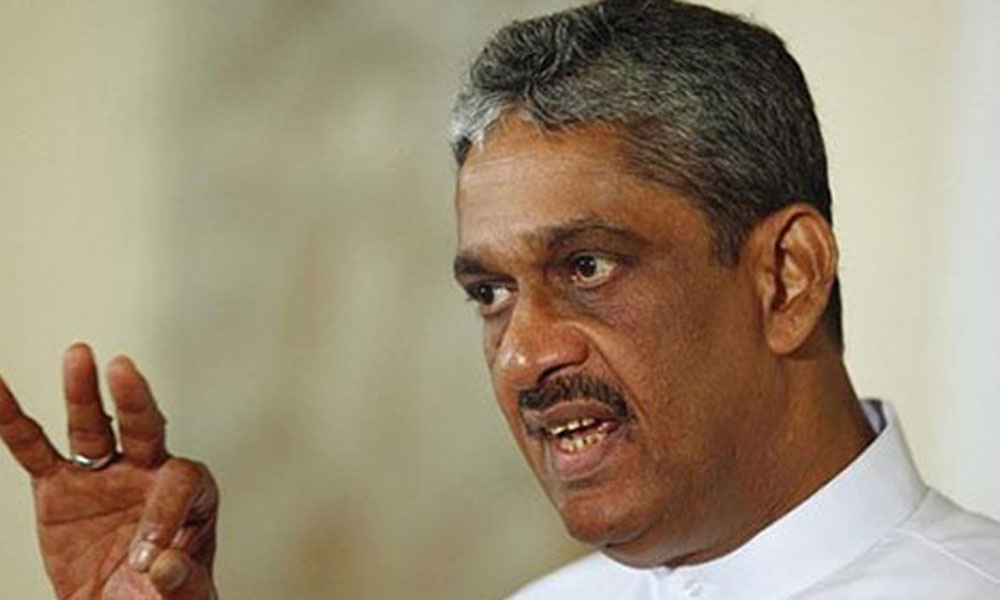
President should be subjected to mental health tests: SF
Page 359 of 515